The McKinsey PEI is 50 percent of the final decision.
You can’t make it at McKinsey if you don’t perform well during your personal experience interview.
That’s why this guide will show you the following:
- What is the McKinsey PEI
- The expectations of your McKinsey interviewers
- What are the most common McKinsey PEI questions
- How to answer those questions
- 3 tips to stand out from the other candidates
- And lots more.
If you want to become a McKinsey consultant, this guide is for you.
Important: besides your PEI interviews, you must stand out during your case interviews. Don’t know what to do? Check out this free case interview course to learn how.
Ready?
Let’s dive in right now.
Table of Contents
Get the latest data about salaries in consulting
What Is the McKinsey Personal Experience Interview?
Mckinsey PEI is a series of questions to understand better who you are and your motivations.
For instance, McKinsey consultants will ask you to share examples from your personal experiences during your interviews.
And your responses will help them understand if you possess the skills and characteristics to thrive at McKinsey.
Which skills and characteristics?
Don’t worry.
This article will give you a lot of details.
But before we jump into those details, let’s see what the McKinsey team has to say about personal experience interviews:
But let’s take a step back for a moment:
A McKinsey interview includes three parts:
- Personal experience interview (also known as McKinsey PEI)
- Case interview
- A Q&A (you can ask questions to your interviewer)
This guide will address the McKinsey personal experience interview (McKinsey PEI).
And more specifically, the three types of McKinsey PEI questions:
- Background question
- Motivation questions
- Experience questions
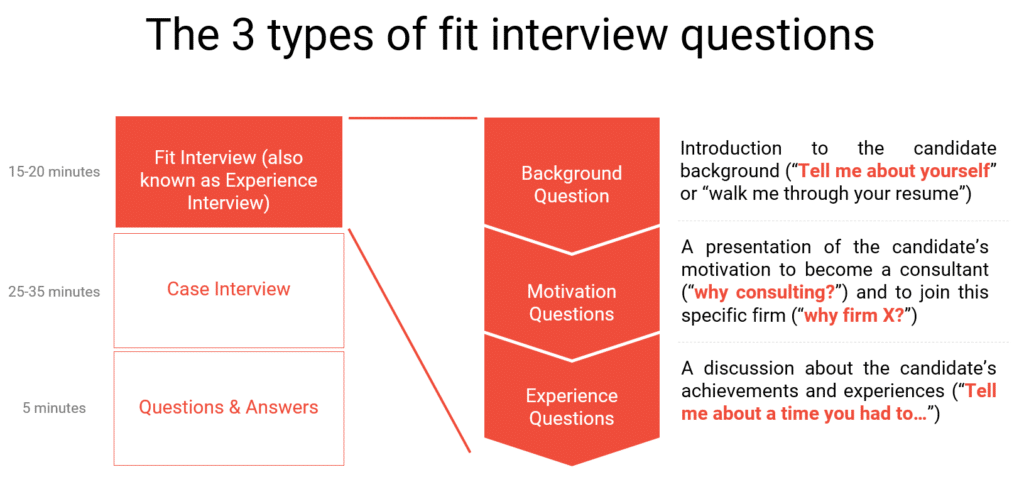
And let me be clear: all McKinsey interviews include PEI questions.
So, there is no way to avoid developing strong PEI answers.
You will be interested in reading these articles too:
Check these articles to get information and tips to ace a consulting case interview:
So now let’s define each Mckinsey PEI question.
And let’s start with the background question.
Background question
Whether you are interviewing at McKinsey or another particular consulting firm, this is often the first thing an interviewer will ask you:
Tell me about yourself.
This is a breaking-the-ice question.
But the goal is clear:
Share with your interviewer an exciting overview of your background (and not just repeat your CV).

Motivations questions
This is an important part of the management consulting interview process.
Like the previous question, all top management consulting firms use motivation questions.
Because your interviewers will assess the risks of moving you along the hiring process.
In other words:
They don’t want to waste their time with candidates not genuinely interested in management consulting.
To assess your motivations, a McKinsey interviewer will ask you questions like:
- Why do you want to pursue a career in consulting?
- And why are you interested in joining McKinsey?
Also, they can challenge your application strategy by asking this question:
What would you do if you had an offer from McKinsey and BCG?

Experience questions (behavioral interview questions)
Experience questions are consulting firms behavioral interviews.
Those questions are like behavioral interview tests.
To do so, McKinsey interviewers will ask you to describe how you reacted to certain situations.
In other words:
Your past behavior is a prediction of your future behavior.
And to do so, a McKinsey interviewer will ask you questions such as:
- Tell me about a time you had to…
- Tell me about a project when..

In a nutshell, sample McKinsey PEI questions are:
- Tell me about yourself
- Why consulting?
- Why McKinsey?
- Tell me about a time when…
Why is McKinsey PEI important?
This is simple:
You can’t get an offer if you are not in the top 1% of candidates in the McKinsey PEI.
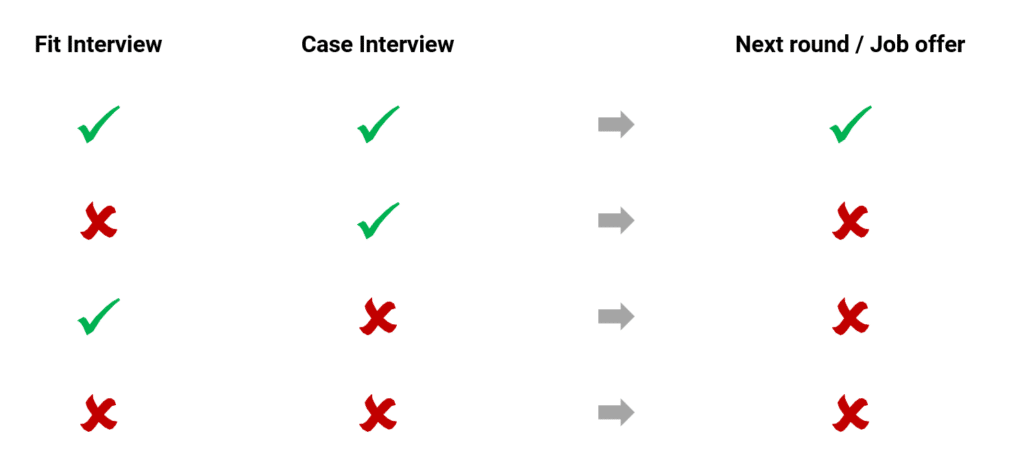
The McKinsey personal experience interview counts for 50% of the decision.
In addition, if you are performing great during the McKinsey PEI, your case interview will be easier.
Because if your interviewers like you at the end of the McKinsey PEI, you’ll get more guidance from interviewers during case interviewers.
At the end of the day, McKinsey interviewers are human beings!
On the other hand, if you perform badly, your case interviews will be more challenging.
Because if your interviewers don’t believe you have the potential to be a consultant at the end of McKinsey PEI, they won’t bother to help you much during case interviews.
What recruiters want
McKinsey interview is known to be very selective.
In fact, only the top 1% of candidates get offers.
And to be one of those top 1%, you must understand what recruiters want.
So, let’s answer this question right now:
They want to assess if you have the right skill set to become a successful consultant.
Also, they want to assess your motivation to join McKinsey.
Remember the two main questions your interviewers try to answer during a McKinsey interview:
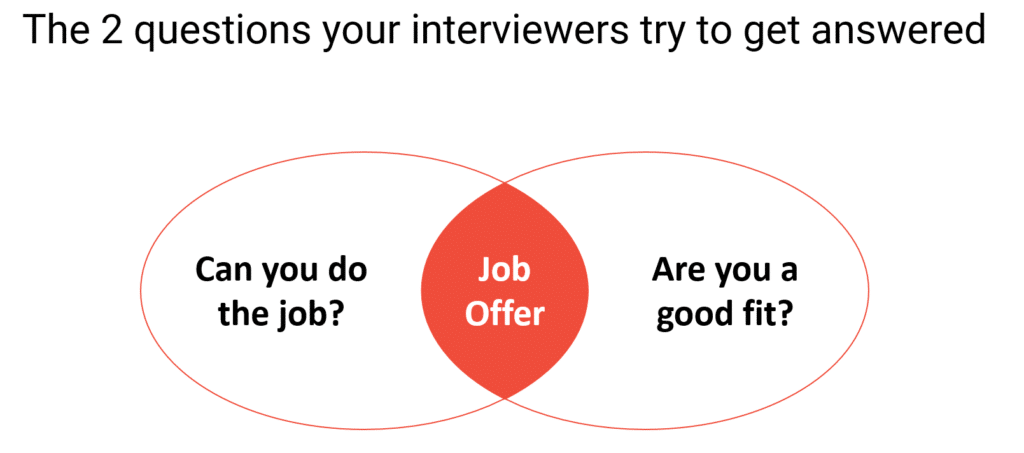
And to assess if you can do the job, interviewers are looking for 5 characteristics:
- Personal impact
- Entrepreneurial drive
- Inclusive leadership
- Problem-solving skills
- And courageous change
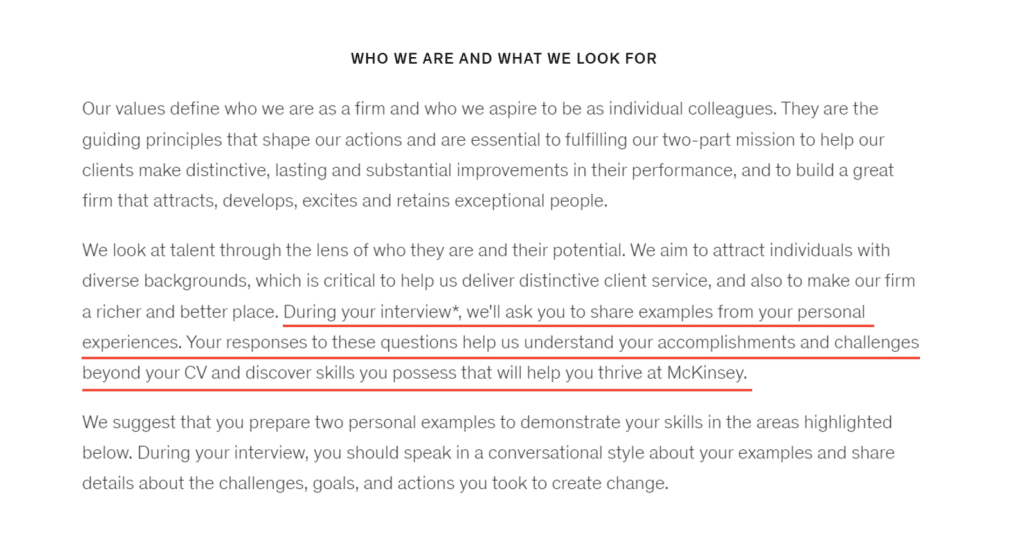
Now we’ll define each of these characteristics.
And let’s start with personal impact.
Personal impact
McKinsey PEI impact means persuasion.
McKinsey wants to know your capacity to influence business decisions.
In other words:
Can you influence consulting firm’s clients to act upon your recommendations?
That’s how McKinsey test personal impact.
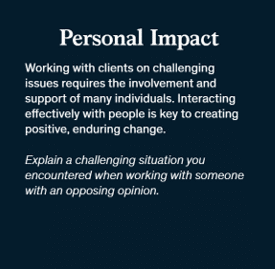
Entrepreneurial drive
Entrepreneurial drive means being performant outside your comfort zone.
McKinsey wants to know if you can excel even when you face a new problem.
Can you perform with the same level of excellence as your area of experience?
Think about what consultants do:
They solve new problems every three months.
New client. New industry. New business situation.
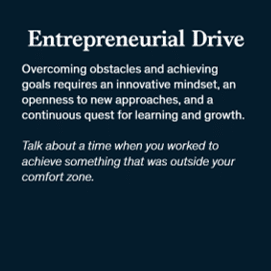
This is how McKinsey test entrepreneurial drive (no need to have created a start-up).
Inclusive leadership
McKinsey is assessing leadership.
They want to know if you work well with others.
Or, more specifically:
If you can solve complex problems while working with others.
And it makes sense:
McKinsey consultants do not work alone.
They work together and with their client team members.
Your McKinsey interviewer will test if you can lead client team members.
That’s why you should have demonstrated exceptional leadership.
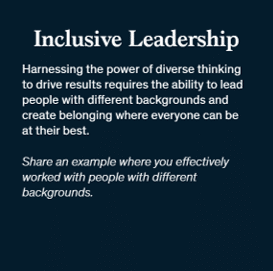
Problem-solving
This one is obvious, right?
The job of a McKinsey consultant is to solve problems!
So, in a McKinsey interview, consultants test your capacity to solve problems.
They do so with case interviews.
But also with the McKinsey PEI by asking you questions about the problems you faced and how you solved those problems.
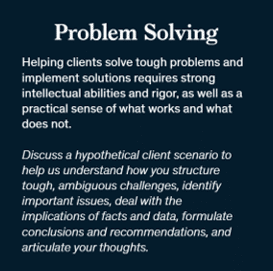
Get 4 Complete Case Interview Courses For Free

You need 4 skills to be successful in all case interviews: Case Structuring, Case Leadership, Case Analytics, and Communication. Join this free training and learn how to ace ANY case questions.
Courageous change
This is a new behavioral interview question.
McKinsey introduced this new characteristic at the beginning of 2023.
And since then, interviewers have used a new McKinsey PEI question in each McKinsey interview:
Revisit a time when you experienced a significant change or encountered an ambiguous situation and share the actions you took to adapt to the new circumstances.
So, what does that mean?
Consultants transform the organization of their clients.
They work with corporations and public organizations to bring change.
Plus, the world is changing.
Think of the following:
- COVID (and its implications on supply chains)
- Artificial Intelligence
- Digitalization of processes
- Etc.
So, bottom line:
Your McKinsey interviewers want to know how you deal with change.
And more specifically, how you navigated a situation of change in the past.
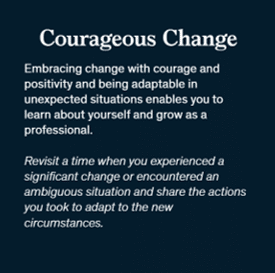
How to answer McKinsey PEI questions
McKinsey personal experience interviews are challenging.
And like case interviews:
The goal is not to answer questions correctly.
But to outperform the other candidates.
So, here are the McKinsey PEI questions I recommend preparing before your consulting interviews:
- Tell me about yourself
- Why consulting?
- Why McKinsey?
- Describe a time when you’ve had to work with someone with an opposing opinion (PERSONAL IMPACT)
- Talk about a time when you worked to achieve something that was outside your comfort zone (ENTREPRENEURIAL DRIVE)
- Share an example where you effectively worked with people with different backgrounds (INCLUSIVE LEADERSHIP)
- Tell me about a complex problem that you solved. Describe the process you used to reach a resolution (PROBLEM-SOLVING)
- Revisit a time when you experienced a significant change or encountered an ambiguous situation and share the actions you took to adapt to the new circumstances (COURAGEOUS CHANGE)
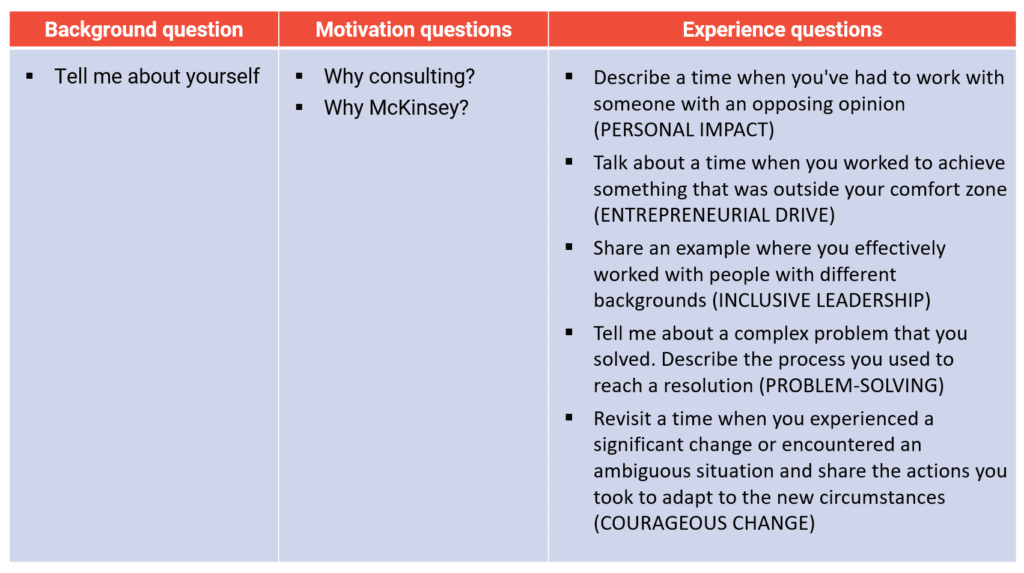
There is no one way to answer PEI questions.
But let me share some important guidelines for each type of PEI question.
Tell me about yourself
This is one of the PEI questions you’ll have all the time.
100% guaranteed!
You can find an in-depth guide on how to answer this question here.
Why consulting?
When you answer this question, there are two major mistakes to avoid.
And everything is explained in this article.
And here is the best part:
You’ll also find plenty of examples to craft your answer.
Why McKinsey?
Most candidates have too generic answers to this question.
This won’t be you!
Read this in-depth guide to craft an outstanding answer.
Personal impact
You must have a personal impact story prepared.
Remember?
This is your capacity to influence someone or a group of people.
So, follow this 3-step framework to craft a memorable personal impact answer:
Step 1: brainstorm
The first step involves identifying the best story to illustrate your persuasion skills.
To do so, ask yourself the following questions:
- Where did I make a recommendation that made someone act?
- Where did I use arguments to gain the support and commitment of others?
- Where did I present my work to a board of Directors or executive people?
- Where did I teach something to someone?
- Where did I take an initiative?
You can use examples from your work, academic or associative experiences.
The best? Work experiences.
Step 2: structure
Your answers must be structured (like in a case interview).
To do so, you can use the STAR or the PARADE framework to structure your answer.
Both frameworks are great.
Step 3: validate and repeat
Now, you should have a first draft ready.
But you are not done yet!
Find an expert and get your answer reviewed!
At CareerInConsulting, we have former McKinsey recruiters and consultants to help you!
And once you have an expert validation, it’s time to rehearse to make your answer sounds natural.
Entrepreneurial drive
For McKinsey, the entrepreneurial drive is your capacity to perform outside your comfort zone.
So, follow this 3-step framework to craft a memorable entrepreneurial drive answer:
Step 1: brainstorm
The first step involves identifying the best story to illustrate your entrepreneurial drive.
To do so, ask yourself the following questions:
- Where did I take risks to do something I have never done before?
- Where did I use an innovative way to solve a problem?
- Where did I implement an innovative solution?
- Where did I create a new and better way for an organization to be successful?
- Where did I create something new or innovative?
- Where did I come up with an unexpected solution that changed the game?
You can use examples from your work, academic or associative experiences.
The best? Work experiences.
Step 2: structure
Your answers must be structured (like in a case interview).
To do so, you can use the STAR or the PARADE framework to structure your answer.
Both frameworks are great.
Step 3: validate and repeat
Now, you should have a first draft ready.
But you are not done yet!
Find an expert and get your answer reviewed!
At CareerInConsulting, we have former McKinsey recruiters and consultants to help you!
And once you have an expert validation, it’s time to rehearse to make your answer sounds natural.
Inclusive leadership skills
For McKinsey, inclusive leadership is your capacity to work well (i.e., solving complex problems) with people with different backgrounds.
So, follow this 3-step framework to craft a memorable inclusive leadership answer:
Step 1: brainstorm
The first step involves identifying the best story to illustrate your leadership.
To do so, ask yourself the following questions:
- Where did I lead a team (or 1 person)?
- Where did I successfully handle a conflicting situation?
- Where did I motivate people to do their best?
- Where did I build strong relationships with someone (or a group of people) to get something done?
- Have I led a club or an association?
- Where did I organize something involving a group of people?
- Where did I volunteer to do something?
You can use examples from your work, academic or associative experiences.
The best? Work experiences.
Step 2: structure
Your answers must be structured (like in a case interview).
To do so, you can use the STAR or the PARADE framework to structure your answer.
Both frameworks are great.
Step 3: validate and repeat
Now, you should have a first draft ready.
But you are not done yet!
Find an expert and get your answer reviewed!
At CareerInConsulting, we have former McKinsey recruiters and consultants to help you!
And once you have an expert validation, it’s time to rehearse to make your answer sounds natural.
Problem-solving skills
As a future consultant, your day-to-day job will be to solve problems!
So, follow this 3-step framework to craft a memorable problem-solving answer:
Step 1: brainstorm
The first step involves identifying the best story to illustrate your problem-solving capacity.
To do so, ask yourself the following questions:
- Where did I answer a complex question through some deep thinking?
- Where did I develop an analysis that helped solve a complex problem?
- Where did I solve a problem that impacted a team or an organization?
- Where did I take a broader view of an issue to solve it?
You can use examples from your work, academic or associative experiences.
The best? Work experiences.
Step 2: structure
Your answers must be structured (like in a case interview).
To do so, you can use the STAR or the PARADE framework to structure your answer.
Both frameworks are great.
Step 3: validate and repeat
Now, you should have a first draft ready.
But you are not done yet!
Find an expert and get your answer reviewed!
At CareerInConsulting, we have former McKinsey recruiters and consultants to help you!
And once you have an expert validation, it’s time to rehearse to make your answer sounds natural.
Courageous change
McKinsey recruiters want to know how you successfully navigated a situation of change.
So, follow this 3-step framework to craft a memorable courageous change answer:
Step 1: brainstorm
The first step involves identifying the best story to illustrate your capacity to embrace change.
To do so, ask yourself the following questions:
- Where did I change something for the better?
- Where did I identify an initiative that changed an organization or a team?
- Where did I work effectively within an organization and modify behavior if necessary?
- Where did I effectively handle political and sensitive situations?
- Where did I ensure a team buy-in and commitment to implement change?
You can use examples from your work, academic or associative experiences.
The best? Work experiences.
Step 2: structure
Your answers must be structured (like in a case interview).
To do so, you can use the STAR or the PARADE framework to structure your answer.
Both frameworks are great.
Step 3: validate and repeat
Now, you should have a first draft ready.
But you are not done yet!
Find an expert and get your answer reviewed!
At CareerInConsulting, we have former McKinsey recruiters and consultants to help you!
And once you have an expert validation, it’s time to rehearse to make your answer sounds natural.
Follow-up questions and other common behavioral interview questions
This is specific to McKinsey PEI.
After a question, your interviewers will ask you probing questions.
The goal?
To understand better how you think.
And to do so, they will dig deeper into your PEI stories to understand why you made a decision, the alternatives or challenges at certain points in your projects, etc.
You can expect between 2 and 5 probing questions (per story) from McKinsey consultants.
Bottom-line:
You must be ready to answer those questions and go into details.
Note: In a Bain and bcg interview, you should NOT have such follow-up questions.
Sometimes you can expect other behavioral interview questions.
To be fully prepared, here is a list of other behavioral questions:
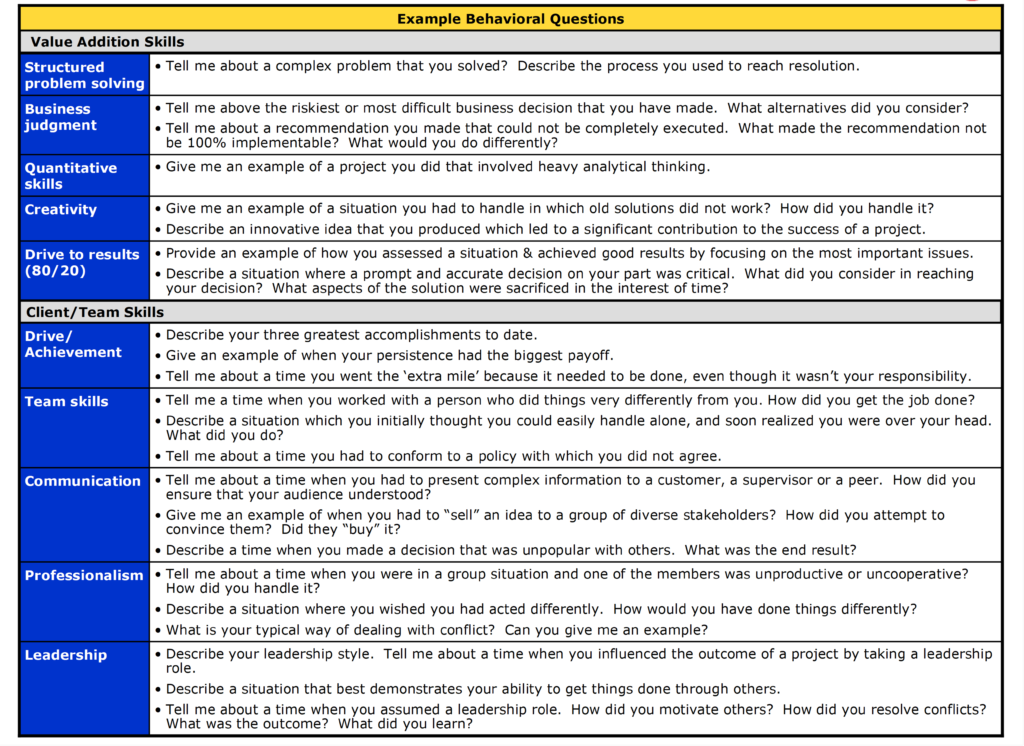
All the above techniques work for these PEI questions as well.
Three tips to ace your McKinsey PEI interviews
Start your preparation early
It takes time to have great answers.
More time than you think.
I know that case interviews are new to you.
And I know you want to focus on case interview preparation.
But do NOT overlook your fit interview preparation.
Remember that your goal is to be in the top 1 percent for the Mckinsey PEI too.
Prepare specific answers
This is a mistake I see a lot:
Candidates not preparing for the specifics of a consulting interview.
And to be clear:
You can’t reuse the answers you used to get accepted at Harvard or land a job at Google.
So, let me repeat because this is important:
You can’t use the same story for an interview at Amazon or other non-consulting companies.
Use storytelling principles
This is the best way to stand out from the hordes of other candidates.
Why?
Because your interviewers don’t want to interview candidates.
Most consultants don’t like interviewing candidates.
They think this is too much time away from their projects.
So, the implication is that you MUST be memorable.
McKinsey PEI example stories
First, a sample “Tell me about yourself” answer.
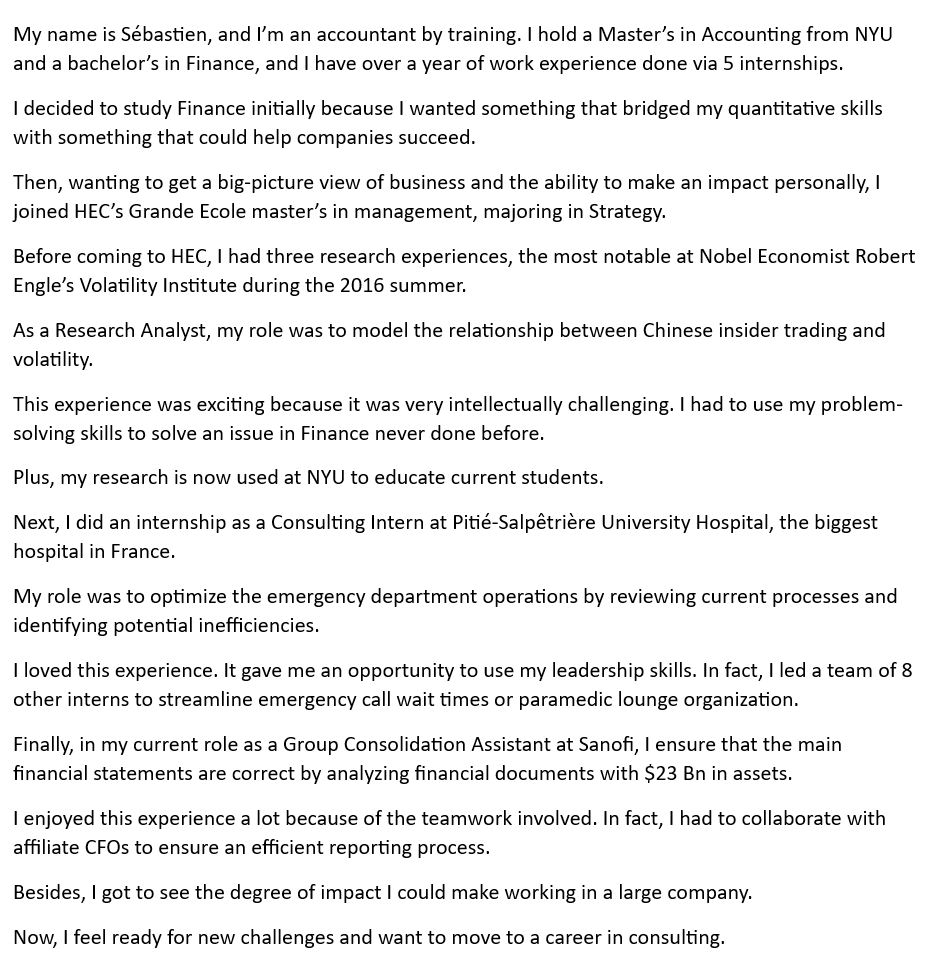
And finally, a third example using the STAR method:
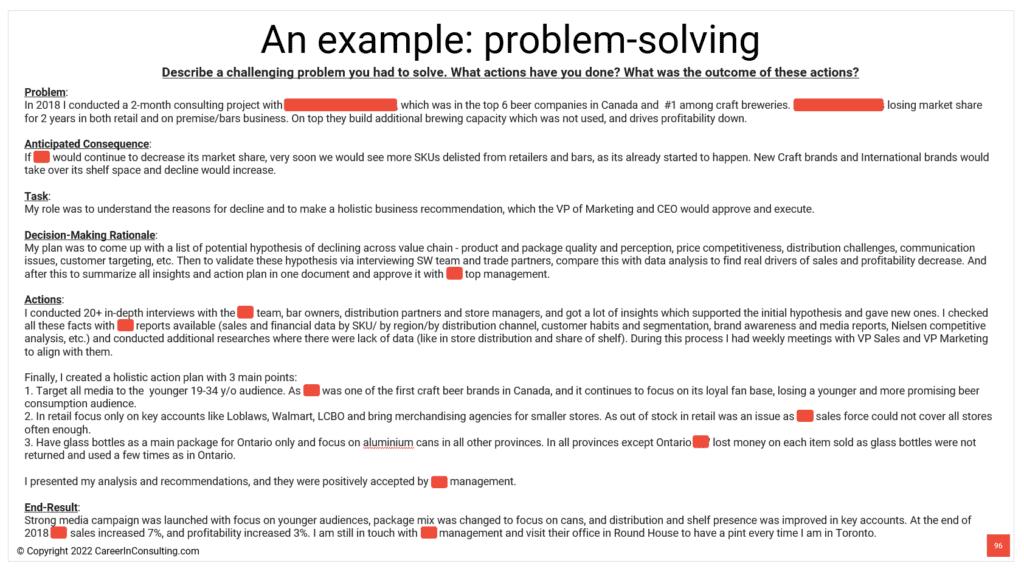
McKinsey PEI: more information
How many prepared stories should I have?
I don’t recommend having multiple stories prepared.
You’ll be more successful if you focus on quality instead of quantity.
So, one PEI story prepared for each question is enough.
Although this supposes that you understand the key principles of a great answer and be able to develop great answers quickly during an interview if needed.
What are the differences between first and final-round interviews?
Short answer: there is no difference.
First-round interviews are the same as final-round interviews.
But let me nuance my answer a little bit.
A former McKinsey Partner once told me that he expects candidates to:
- Project more maturity
- Have a concise communication
- Showcase strong business acumen
Are McKinsey Personal Experience Interview questions different from one role to another?
Short answer: no.
Whether you apply for a junior consultant or a team leader role, this guide about PEI interview is valid.
How does McKinsey PEI differ from other consulting firms?
The main difference is the follow-up questions.
McKinsey interviewers ask follow-up questions when interviewers from other top consulting firms don’t.
Can I use the same story with two different McKinsey interviewers?
Short answer: yes.
Usually, the second mckinsey interviewer doesn’t know precisely the answers you shared with the first interviewer.
I know that McKinsey recommends preparing two answers for each McKinsey PEI question.
However, I don’t.
I think one qualitative answer (per McKinsey PEI question) is enough.
How long should McKinsey PEI answers be?
McKinsey PEI answers should be between 1:30 and 2 minutes.
But there is an exception:
For the “Tell me about yourself” question, you can go up to 3 minutes.
McKinsey PEI: final thoughts
Important: besides your PEI interviews, you must stand out during your case interviews. Don’t know what to do? Check out this free case interview course to learn how.
Top management consulting companies use PEI questions to assess if you can do the job.
And McKinsey is no exception.
They want to assess your leadership skills, communication skills, problem-solving skills, and other critical consulting skills.
Now, it’s your turn.
Tell me what you think is the most challenging in answering McKinsey PEI questions.
Is it the background question?
The motivation questions?
Or the experience questions?
Tell me by leaving a comment below now.
Anyway, I hope this guide’s example McKinsey PEI questions will help you get an offer!
Sébastien
Get 4 Complete Case Interview Courses For Free

You need 4 skills to be successful in all case interviews: Case Structuring, Case Leadership, Case Analytics, and Communication. Join this free training and learn how to ace ANY case questions.
SHARE THIS POST
